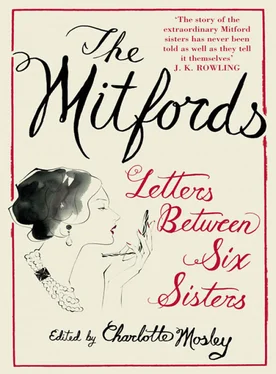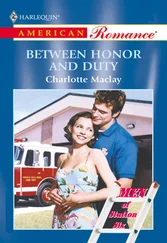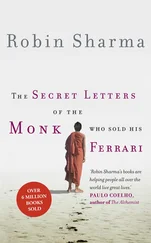1Jessica’s daughter, Julia, was born on 20 December.
2Esmond had found work as a copywriter with a London advertising agency.
1The foreign policy speech that Hitler made four days later gave encouragement to the Austrian Nazi Party.
2Kurt von Schuschnigg (1897–1977). Anti-Nazi Chancellor of Austria since 1934. Hitler threatened to invade Austria unless concessions were made to the Nazi Party. Schuschnigg resigned and in March 1938 Germany annexed Austria.
3‘Have you heard? Schuschnigg is with the Führer.’
4‘Over there in the Reich.’
1Jessica and Esmond’s baby daughter, Julia, had just died from measles, aged five months. They had decided to go to Corsica for three months to try to recover.
1Lord Redesdale’s visits to Germany to see Unity had led him to revise his opinion of Nazism and, until Hitler invaded Czechoslovakia in March 1939, he was sympathetic to the regime. In a speech to the House of Lords, he had announced that the Anschluss was the ‘sincere desire’ of a large majority of Austrians and that the gratitude of Europe was due to Hitler for averting bloodshed.
1Unity had flirted with the French officer when the sisters visited Corsica during their cruise of the Mediterranean in 1936.
2‘Boud, I hope you haven’t forgotten your Boud.’
3Frances Mitford (1875–1951). Lord Redesdale’s eldest sister who was popular with all her nieces. Married Alexander (Alec) Kearsey in 1907.
4‘A pretty woman’s hairstyle.’
1The Berghof was Hitler’s mountain retreat at Obersalzberg, which he had converted from a simple Alpine house into a residence suitable for receiving foreign dignitaries.
2The annexation of Austria.
3‘Only much cleaner.’
4‘She’s delighted to hear you say that.’ Unity’s dislike of Italians was a running joke between her and Hitler.
5Wilhelm Ohnesorge (d. 1962). German Minister of Posts and Telegraphs who was sympathetic to the Mosleys’ plan to set up a radio station.
6‘Where is your sister?’
7Julius Schaub; Hitler’s personal adjutant and former head of his bodyguard.
8Gerdy Troost (1904–2003). Interior designer and a confidante of Hitler. Married to Paul Ludwig Troost (1878–1934), one of Hitler’s favourite architects.
9‘Of course it’s a disadvantage for me because if I drive that fast I get there twenty minutes early, then I have to sit and wait in my hotel or at home for twenty minutes.’
1The Sudeten-German Party of Czechoslovakia, led by Konrad Henlein (1898–1945) who was instrumental in preparing the way for Hitler’s occupation of his country in 1939.
2Georg Wollner; Gauleiter of Reichenberg.
3‘Because I have to bring the Führer out.’
4‘The Führer is coming! The Führer is coming!’
5‘It is a pleasure and an honour for me to greet you, my Führer.’
6Willy Kannenberg; Hitler’s cook.
7Franz Gürtner (1881–1941). Reich Minister of Justice since 1932 who opposed Nazi brutality but was unable to stand up to Hitler.
8‘Next time the judges let that sort of man free, I’ll have him arrested by my bodyguards and sent to a concentration camp; then we’ll see who is stronger, the letter of Herr Gürtner’s law or my machine guns!’
9Dr Leopold von Hoesch (1881–1936). German ambassador to London 1932–6.
1Hitler’s special train.
2Gerhardt Wagner (1888–1938). Reich Medical Leader who was instrumental in formulating the infamous Nuremberg Laws that established anti-Semitism and euthanasia as official Nazi policy.
3Arthur Seyss-Inquart (1892–1946). Leader of the Austrian Nazi Party and keen supporter of Austria’s union with Germany, who became governor of Austria after the Anschluss.
4Hans von Tschammer-Osten (1887–1943). Reich Sports Leader and president of the German Olympic Committee in 1936.
5‘Dear Führer, when are you coming to us?’ and ‘Führer, once again we swear undying loyalty to you’.
6Joseph (Sepp) Dietrich (1892–1966). Hitler’s close associate and head of his SS bodyguard.
7Winifred Williams (1897–1980). The English-born wife of Richard Wagner’s son, Siegfried, had been a friend and ardent admirer of Hitler since 1923. In 1930, she became head of the Bayreuth Festival and ran it until the end of the war.
8E. M. Forster’s novel was first published in 1924.
1This letter was transcribed in Lady Redesdale’s memoir of Unity. The original has not been found.
2‘Power, table and ugh; penny cosy and racial disgrace,’ (i.e. interracial sex).
3Henry Bernstein (1876–1953). French boulevard-theatre playwright.
4Maud Burke (1872–1948). American-born widow of Sir Bache Cunard, the shipping-line magnate, whom she married in 1895. Changed her name to ‘Emerald’ in 1926 and was one of London’s leading society hostesses between the wars.
1Diana was expecting a baby in November.
2Theodor Morell (1886–1948). Hitler’s private physician.
3Ribbentrop.
1Lord Andrew Cavendish (1920–2004). Succeeded as nth Duke of Devonshire in 1950. Deborah’s future husband was a student at Cambridge when they first met.
1Unity had written to the Daily Express to deny an article in ‘William Hickey’ which said that ‘those members of Britain’s governing class whose Aryanism has been okayed by Unity Mitford are packing their bags for Nuremberg’. (2 September 1938) A photograph of her letter accompanying the article shows that it had been signed by Unity but was in Lady Redesdale’s handwriting.
2After more than four years of marriage, Nancy was at last expecting a child but in spite of carefully following her doctor’s instructions, she miscarried a few weeks later.
1Diana’s son, Alexander (Al) Mosley (1938–2005), was born on 26 November.
2Nancy was editing the letters of her ancestors Maria Josepha, Lady Stanley of Alderley, and Henrietta Maria Stanley. Published as The Ladies of Alderley (1938) and The Stanleys of Alderley (1939).
3Roy Harrod (1900–78). Influential economist who taught at Christ Church, Oxford. Married Wilhelmine (Billa) Cresswell in 1938.
4Lord David Cecil (1902–86). Biographer and professor of English Literature at Oxford 1948–70. Married Rachel McCarthy in 1932. Their son Jonathan was born in 1939.
1Hitler’s occupation of Czechoslovakia on 15 March violated the Munich Agreement and had brought all efforts at appeasement to an end.
1This extract was transcribed in Lady Redesdale’s memoir of Unity. The original has not been found.
2The cover name used by Hitler at the beginning of his political career and adopted as a nickname by his intimates. Neither Unity nor Diana used the name to his face but from 1938 often referred to him as ‘Wolf in letters.
3‘Wisdom is no help.’
1On the previous day, the German army had invaded Poland. Hitler ignored Britain and France’s ultimatum to withdraw and on 3 September Neville Chamberlain, the British Prime Minister, declared war.
2‘I have proposed friendship to England again and again and, when necessary, the closest collaboration. But love cannot be all one-sided, it must be reciprocated.’
3Unity’s Great Dane, given to her by Diana.

Unity, Tom, Deborah, Diana, Jessica, Nancy and Pamela, 1935.
On the afternoon of 3 September 1939, the day that Britain and France declared war on Germany, Unity went to the English Garden in the centre of Munich and put a pistol to her head. The bullet lodged in her brain, failed to kill her but inflicted irreversible damage. She was taken to a Munich hospital were she lay unconscious for several weeks. Communications between England and Germany were difficult in the early part of the war and on Hitler’s orders no report of Unity’s suicide attempt appeared in the German press. It was two months before the Redesdales received any definite news of their daughter and a further two months before they were able to fetch her home from a clinic in neutral Switzerland where Hitler had arranged for her to be sent. In January 1940, Lady Redesdale and Deborah travelled to Bern and found Unity still seriously ill, paralysed, with her hair matted and untouched since the day she had tried to shoot herself. They brought her back to England in an ambulance and Lady Redesdale took on the distressing task of looking after her daughter, who was left with the mental age of a twelve-year-old and in whom religious mania had replaced Hitler mania. Unity’s behaviour was unpredictable, alternating between bouts of fury and moments of pathetic vulnerability, and she was untidy, clumsy and incontinent at night. The Redesdales’ marriage was already under stress from political disagreements – when Hitler invaded Czechoslovakia Lord Redesdale reverted to being violently anti-German while Lady Redesdale continued to regard the Führer as Germany’s saviour – and it deteriorated further with the strain of Unity’s infirmity. Lord Redesdale withdrew to Inch Kenneth, a small island off the coast of Mull in the Inner Hebrides which he had bought after selling Swinbrook House, taking with him Margaret Wright, the parlourmaid, who became his companion and remained with him until the end of his life. Lady Redesdale took Unity to Mill Cottage in Swinbrook, where they lived for most of the war.
Читать дальше













